Try These 15 Bath Must-Haves for Softer Skin and Aromatherapy Benefits
A hot bath can't solve everything, but it does offer a brief respite when you need it most. And while soaking in a tub is relaxing in and of itself, you might as well find some things to put in your bath that work double duty to make it smell nice *and* make your skin softer in the process. We're not talkin' about the run-of-the-mill bath salts and bubbles (although those certainly are luxurious) but all the other things you can put in your bath that can elevate your soak tenfold.
We spoke with a slew of experts to learn more about what a zhuzhed-up bath can do for your body and brain after a long day. Read on for their recommendations of the best bath-enhancing items to buy, plus plenty of DIY bath additives to try at home.
- Caren Campbell, MD, board-certified dermatologist in Northern California
- Dara Weiss, aromatherapist and founder of L’or de Seraphine
- Debbi Burnes, founder of Sumbody
- Greta Fitz, founder and CEO of Ascention
- Jennifer Palmer, holistic wellness coach
- Joshua Zeichner, MD, director of cosmetic and clinical research in dermatology and associate professor of dermatology at Mount Sinai Hospital
- Katerina Mountanos, founder of Kosterina
- Keira L. Barr, MD, board-certified physician and menopause expert
- Libby Rhee, DO, board-certified dermatologist and clinical instructor of dermatology at Mount Sinai Hospital in New York City
- Meghan Rose, spiritual advisor and tarot reader
- Shel Pink, founder of Sparitual and author of Slow Beauty
- Stacy Chimento, MD, board-certified dermatologist at Riverchase Dermatology in Miami Beach, FL
- Tara Pelletier, co-founder of Meow Meow Tweet
Why add soothing bath products?
If dewy skin is what you're after, adding moisturizing agents to your bathwater can help make it happen. "Bath additives are a great way to hydrate and soften the skin," says Joshua Zeichner, MD, a dermatologist in New York City. "By sitting in the bath for an extended period of time, it allows the bath additive to do its job effectively."
The scent of bath products can also be beneficial, as they can signal to your brain that it's time to unwind and relax. "Fragrance impacts all of my moods," says Dara Weiss, aromatherapist and CEO and founder of home fragrance brand L'or de Seraphine. "It's so helpful to set the mood and get into that headspace." By tossing in a little of this or a little of that, you can transform your bathroom into a proper spa and make the most out of your bathtime routine.
{{post.sponsorText}}
Things to consider before buying
- Your scent preferences: Most bath additives can be rather fragrant. You'll want to be sure you're ok with the scent you're dropping into your tub, especially because it will linger on your skin for a while afterward.
- Any sensitivities: If you have sensitive skin, you'll want to keep that in mind while shopping for skin-softening bath ingredients. Colloidal oatmeal is on the safer side for sensitive skin types, while tea tree or eucalyptus oils may be harsh for some. And, as Zeichner mentioned above, if you are prone to acne breakouts on your chest or back, you'll want to avoid heavy doses of olive oil in your tub.
- Budget: If you're not sure about spending money on bath products, there are plenty of DIY bath additives on our list that you might already have in your home. Citrus, olive oil, ginger, and milk all provide their own benefits, so it may be worthwhile to try them before you shell out on pricier items.
- Clean-up: Keep in mind that anything you add to your bathwater will either go down the drain or linger in your tub. Oils may require a second rinse to fully remove from the bath but are relatively low maintenance. Flower petals and colloidal oatmeal can be a little messier to clean up after you're done soaking.
15 things to add to your bath for softer skin and aromatherapy benefits
1. Olive oil
"Pour a cup of olive oil into your bathtub and soak for 10 minutes," says Dr. Zeichner. "Olive oil is rich in natural fats that hydrate dry skin." (Note: He does not recommend olive oil for acne-prone skin, especially if you experience breakouts on your chest or back.) "Be careful when you stand up because the bathtub may be slippery," he adds.

To level up this routine, Katerina Mountanos, founder of Kosterina olive oil, adds the oil directly to her skin before bathing. “I usually put Kosterina EVOO on my arms and legs and then do other things like brush my teeth, tweeze my eyebrows, etc. for 15 to 20 minutes,” she says. “Then when you get in the bath, it will be in your bathwater to moisturize your skin for even longer.” This works especially well for dry spots such as the elbows, ankles, and feet, Mountanos adds.
For bonus points, she recommends tossing olive oil into your hair from the ears down and then tying it up while you take a bath (for at least 20 minutes). “Once the time is up, shampoo and rinse your hair out with water,” she says.
Pros:
- Harvested and cold-pressed in Greece
- Can also be used for cooking (of course!)
- Leaves skin feeling smooth and soft
Cons:
- Pricier option for olive oil
2. Flower petals
"For a true goddess bath, I add flowers by cutting away the stems and placing the petals in the tub," says Greta Fitz, founder of fragrance company Ascention. You can do this with fresh flowers or get a pack of dried flowers to keep on hand.
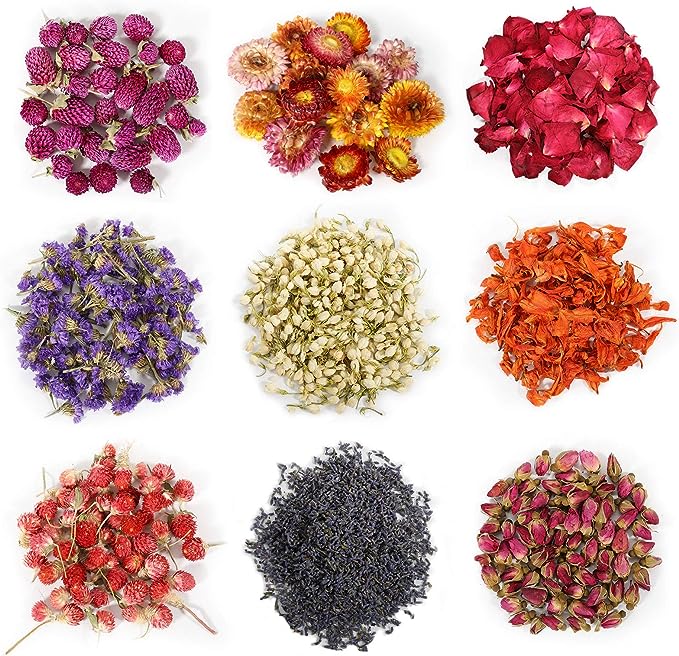
This bundle of dried flowers includes nine different varieties of petals, including rose, jasmine, lavender, and lily petals. They’re individually packed to maintain their fragrance, so you can customize your bath by adding any combination of petals you’d like. Plus, at under $10 you can’t beat the price.
Pros:
- Adds a visual and olfactory boost to your bath
- Includes nine different types of flower petals
- Comes with tweezers and two drawstring bags to divvy up the petals
Cons:
- Smaller packages may not last very long
3. Eucalyptus and tea tree oil
"My favorite addition to my bathing ritual is to add a few drops of organic eucalyptus oil and organic tea tree oil to both my bath and my shower, coupled with a deep breathing exercise: inhale to the count of 4, hold for 7, exhale for 8," says Shel Pink, founder of vegan beauty brand, Sparitual, and author of Slow Beauty. "The eucalyptus is excellent for lung health, helps to deepen breathing and promotes a healthy respiratory system, and the tea tree oil is a mood booster and helps to also boost the immune system." (Fresh eucalyptus works, too).
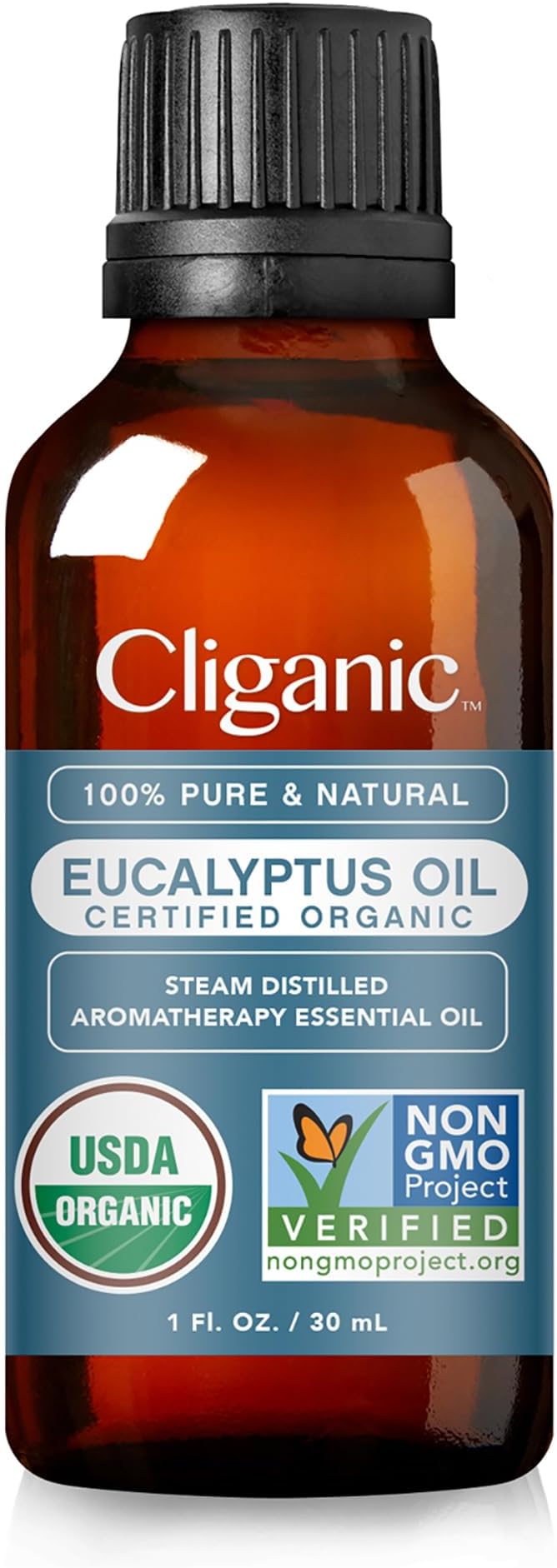
Cliganic’s steam-distilled eucalyptus oil is USDA-organic certified, non-GMO, and cruelty-free. Plus, the brand has all of their batches third-party tested to ensure the product is safe and high-quality. It comes in a UV-safe brown bottle (which helps extend its life), and has a German cap-style dropper to help control how much oil comes out. On that note, before you drop it into the bath, keep in mind that this eucalyptus oil isn’t diluted with any other oils, so a little will go a long way!
Pros:
- USDA-organic and third-party tested
- Cap-style dropper helps control how much you use
- Dark bottle preserves shelf life
Cons:
- May be drying for some skin types
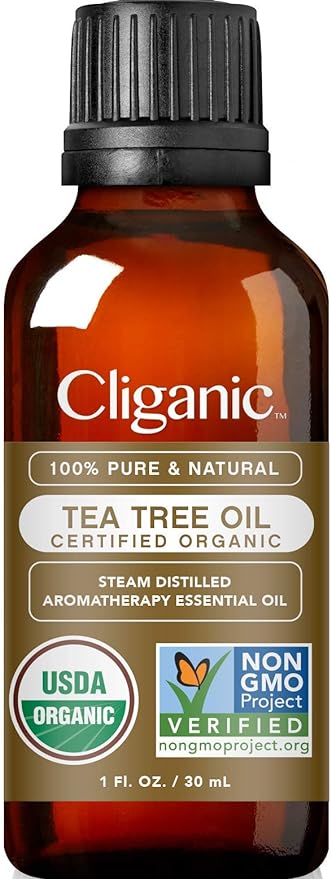
Another steam-distilled, USDA-certified organic pick, Cliganic’s tea tree oil is a great way to open up your sinuses and cleanse your skin (thanks to its antimicrobial properties). Use it alone, or combine it with eucalyptus oil to make your bathroom smell like a lush spa. As with the eucalyptus oil above, keep in mind that a small amount will go a long way in your bath water. And, especially because tea tree oil can be drying, you might want to consider adding olive oil or another moisturizing agent to the bath at the same time.
Pros:
- USDA-organic and third-party tested
- Bright, spa-like scent opens sinuses
- Anti-microbial
Cons:
- May be too drying for some skin types
4. Rosemary
"Rosemary eases stress, increases circulation, decreases inflammation, boosts mood, and helps to increase focus and concentration," says Pink. "Add a few sprigs to your bath and couple it with the same deep breathing exercises [as above] to deepen breathing and help to boost lung health.”
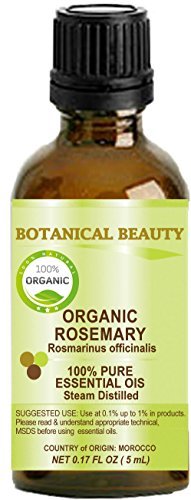
Fitz also likes rosemary, but she uses it in oil form. “I use rosemary oil to rejuvenate and bring clarity,” she says. This pick from Botanical Beauty uses pure steam-distilled organic rosemary oil. Rosemary has long been touted for its antioxidant and anti-inflammatory properties, but it has also recently gotten a lot of attention in the hair-care department. Fitz also notes that, because it’s 100 percent rosemary oil, this is another pick you’ll want to go light on it since it’s extremely pungent.
Pros:
- 100 percent organic rosemary oil
- Can also boost hair growth and promote softness
- Antioxidant and anti-inflammatory properties
Cons:
- Extremely pungent
5. Lavender
Fitz is a huge fan of lavender in the bath for relaxation and calm. Sometimes, she uses dried lavender flowers: "Rub them between your hands to activate their aroma and sprinkle the buds into the bath," she says. Other times, she uses a blend of two parts lavender oil and one part rosemary oil.
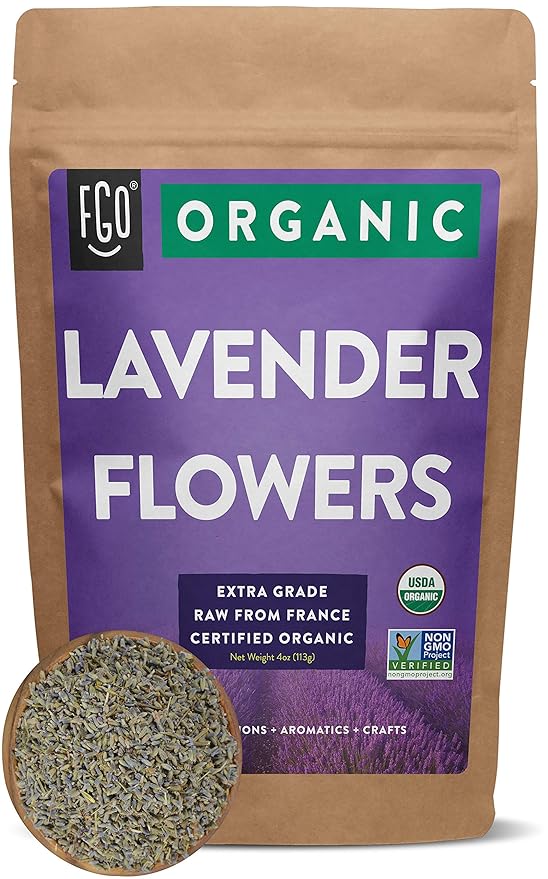
Rub some of these lavender petals between your hands before sprinkling them into your bathwater and get ready to relax. FGO Organic sources its certified organic petals from France and then packs them into natural, resealable kraft bags in California. They’re available in 4-, 16-, and 32-ounce sizes.
Pros:
- Soothing scent
- Organically grown in France, packed in California
- Three size options
Cons:
- A little messy to clean up
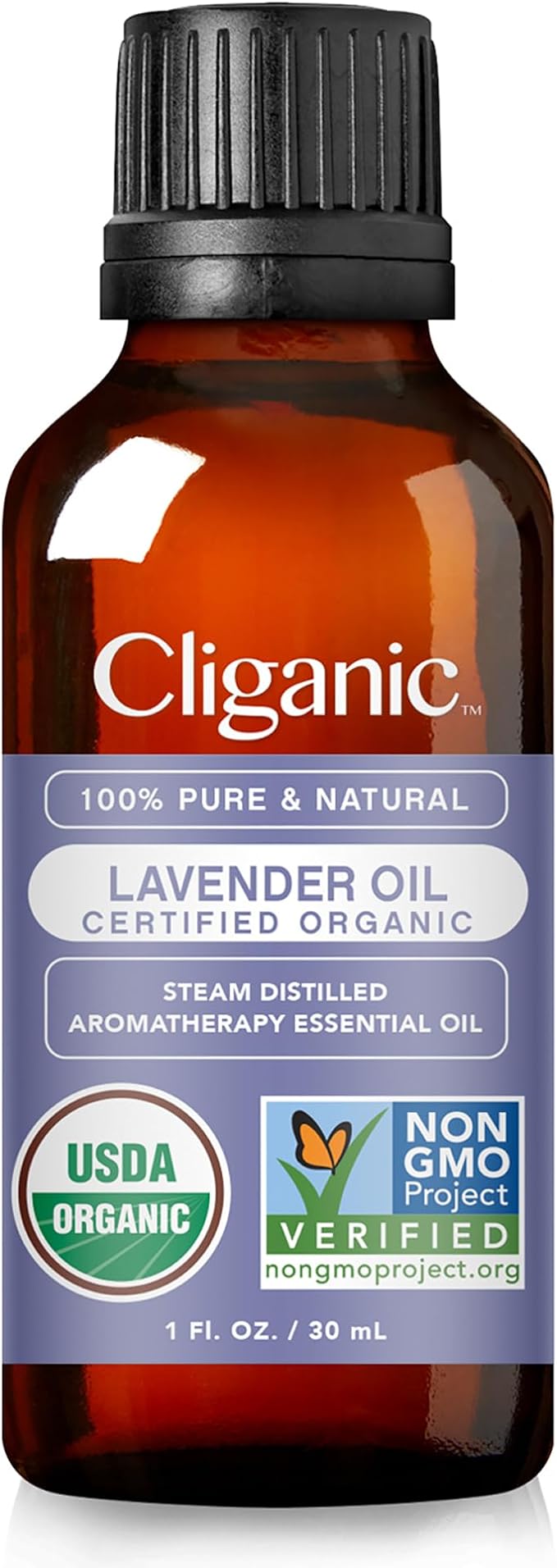
Another pick from Cliganic, this USDA organic-certified lavender oil is a potentially less messy way to incorporate lavender into your bath. While the petals (above) provide a more visual effect, this steam-distilled oil packs a stronger punch of fragrance. It’s another oil with considerable antiseptic and anti-inflammatory properties, and its long been revered as one of the best essential oils to promote relaxation. However, like the other oils we listed above, you’ll want to consider adding epsom salts or moisturizing oils to the bath to avoid drying the skin.
Pros:
- USDA-organic and third-party tested
- 100 percent pure lavender oil
- Can also be used to help treat acne spots (when combined with a carrier oil)
Cons:
- May dry out skin
6. Cinnamon sticks
Adding a few cinnamon sticks to your bath can be revitalizing and uplifting, too. Plus, it can help clear out any stagnant energy, explains Meghan Rose, a spiritual advisor and tarot reader. “Cinnamon has been deemed by ancient Egyptians, Romans, occultists, spiritualists, and Ayurvedic practitioners as a healing agent with high vibrational qualities that attract prosperity and abundance to those who use this powerful spice," says Rose.
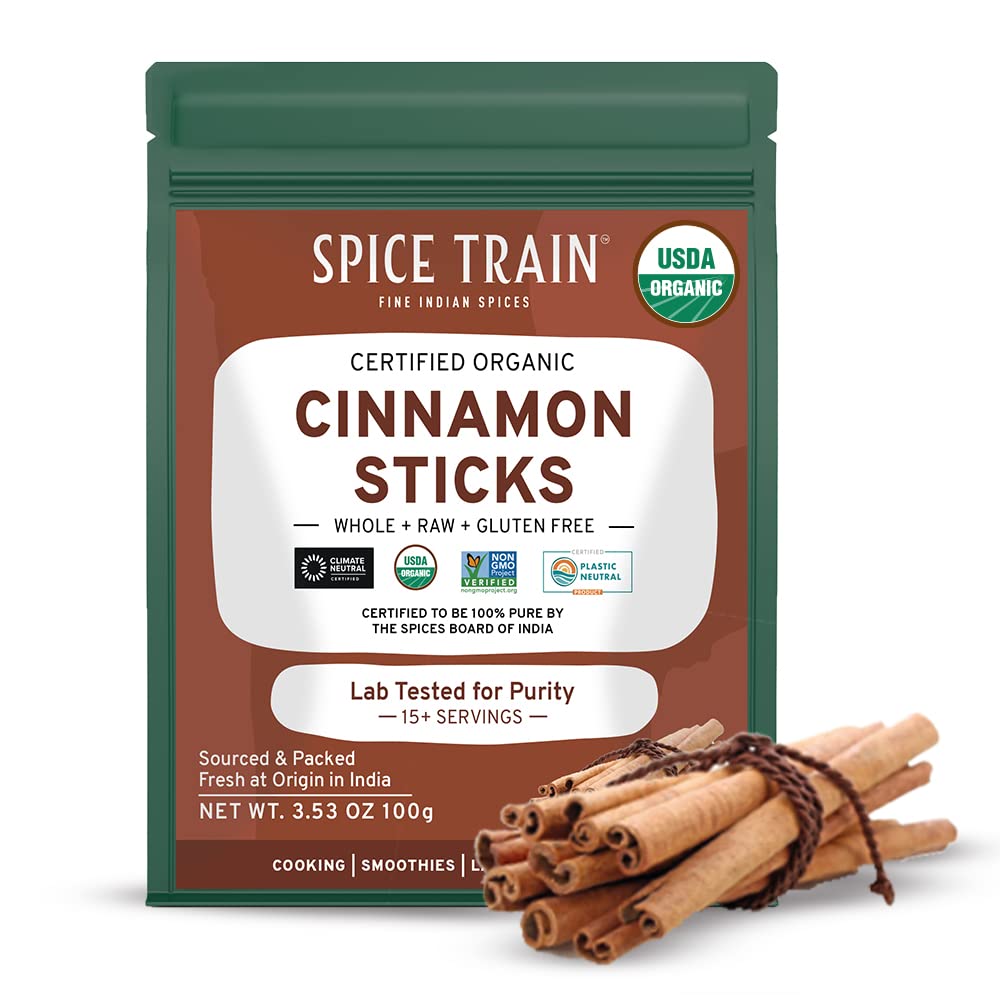
Sure, you could buy cinnamon sticks at your local grocery store. But Spice Train’s non-GMO sticks are sourced and packed fresh in India, and third-party tested for purity by the Spices Board of India. Plus, they’re USDA Organic certified and the company is Climate Neutral and Plastic Neutral certified. Yeah, we didn’t know cinnamon sticks could be this good either.
When you’re not dropping cinnamon sticks into your bath, you can use them for cooking, brewing tea, building gingerbread houses, and so much more.
Pros:
- USDA organic, climate-neutral, and plastic-neutral company
- Sourced and packed fresh in India
- Great multi-purpose pantry item
Cons:
- Slightly pricier option for cinnamon sticks
7. Oats
"For dry, itchy skin, consider an oat bath," says Dr. Zeichner. "Oat extract forms a protective and hydrating seal over the surface of the skin and contains anti-inflammatory avenanthremides." He suggests Aveeno's soothing bath treatment ($6) but notes that a cup of traditional breakfast oatmeal works well, too.
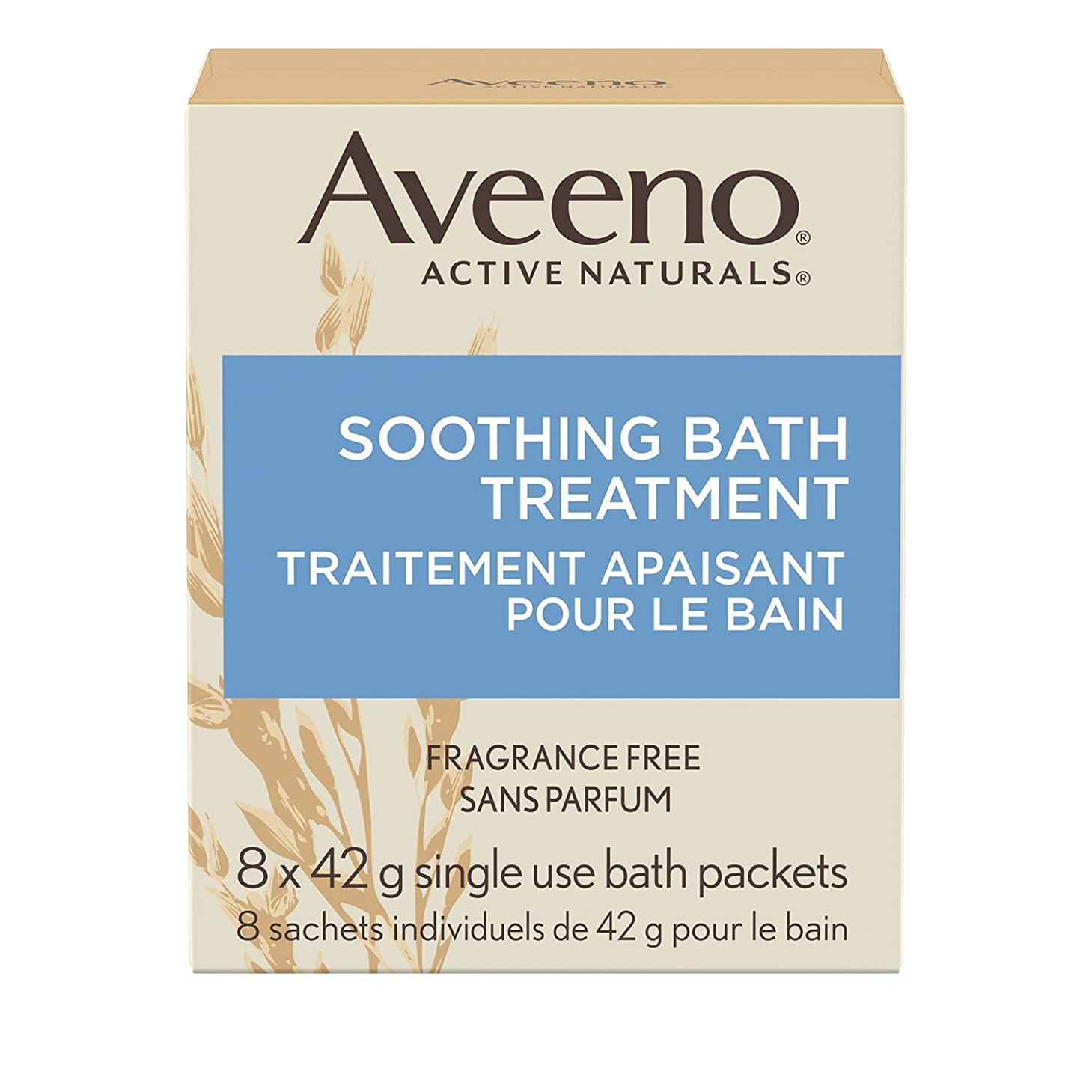
Aveeno’s oatmeal bath sachets are a tried-and-true way to add moisturizing colloidal oatmeal—which is known for reducing inflammation and soothing irritation—to your bathwater. Simply empty the packet into a warm tub, stir, then climb in for a 15-20 minute soak. It’s a great option for those with eczema, sunburn, or bug bites, but also a good way to add moisture to your regular skin-care routine.
Pros:
- 100 percent colloidal oatmeal
- Fragrance-free and safe for sensitive skin
- Hydrates and nourishes the skin
Cons:
- May leave clumps in the tub
8. Epsom salt
"For inflamed skin, Epsom salt has long been used," says Dr. Zeichner. "This magnesium-based salt has anti-inflammatory properties and can soothe the skin."
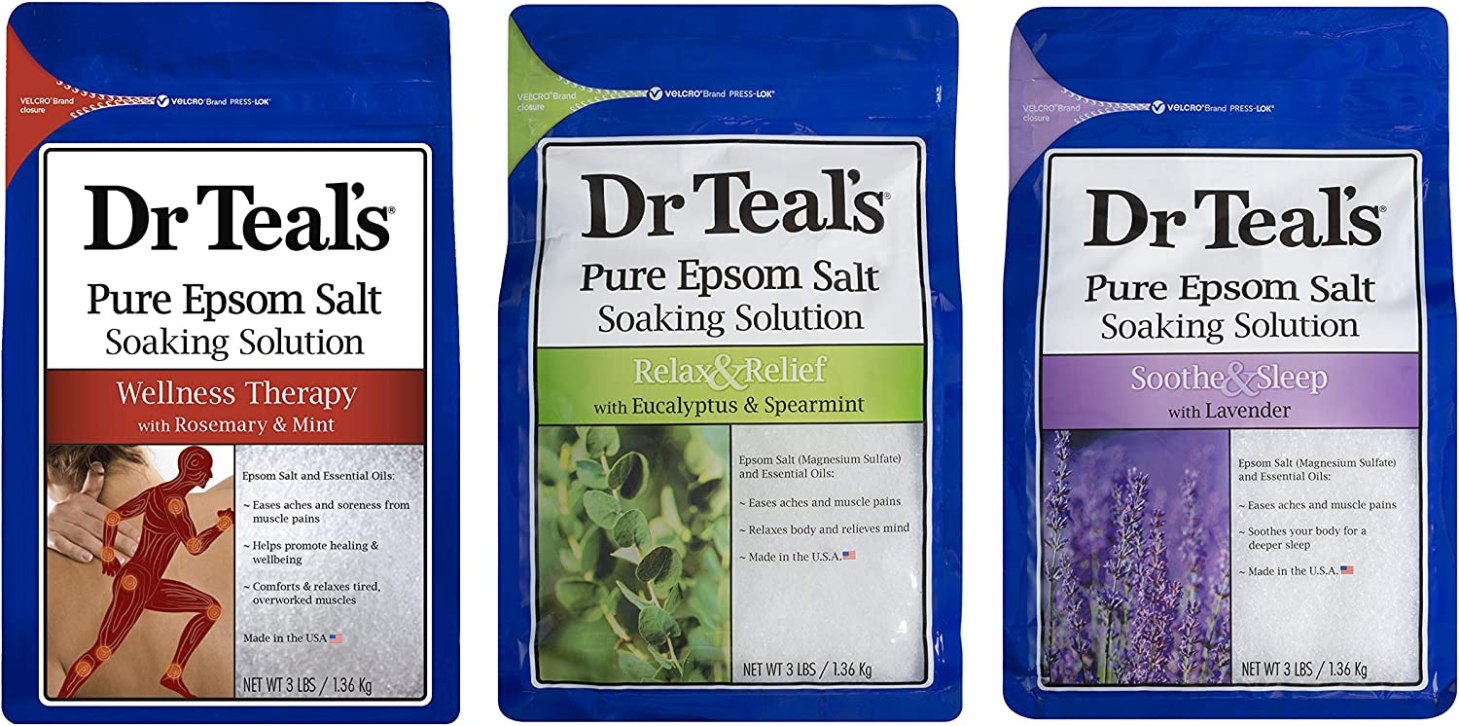
This pack of three Epsom salt blends from Teal’s includes salts infused with eucalyptus spearmint, lavender, and rosemary mint essential oils. It’s an efficient way to get the soothing benefits of Epsom salt (aka magnesium sulfate) and a bit of aromatherapy. The rosemary mint and eucalyptus spearmint scents are great for when you need a bit of energy, while lavender helps you relax and wind down before bed.
Pros:
- Dr. Teal’s is a reputable source of magnesium sulfate
- Three aromatherapy effects
- Made in the USA
Cons:
- Pricier option
9. Green tea
"The polyphenols in tea provide anti-inflammatory properties," Debbi Burnes, founder of skin-care brand Sumbody, previously told W+G. "Green tea is approximately 20 to 45 percent polyphenols by weight, of which 60 to 80 percent are catechins, such as EGCG, which are antioxidants."
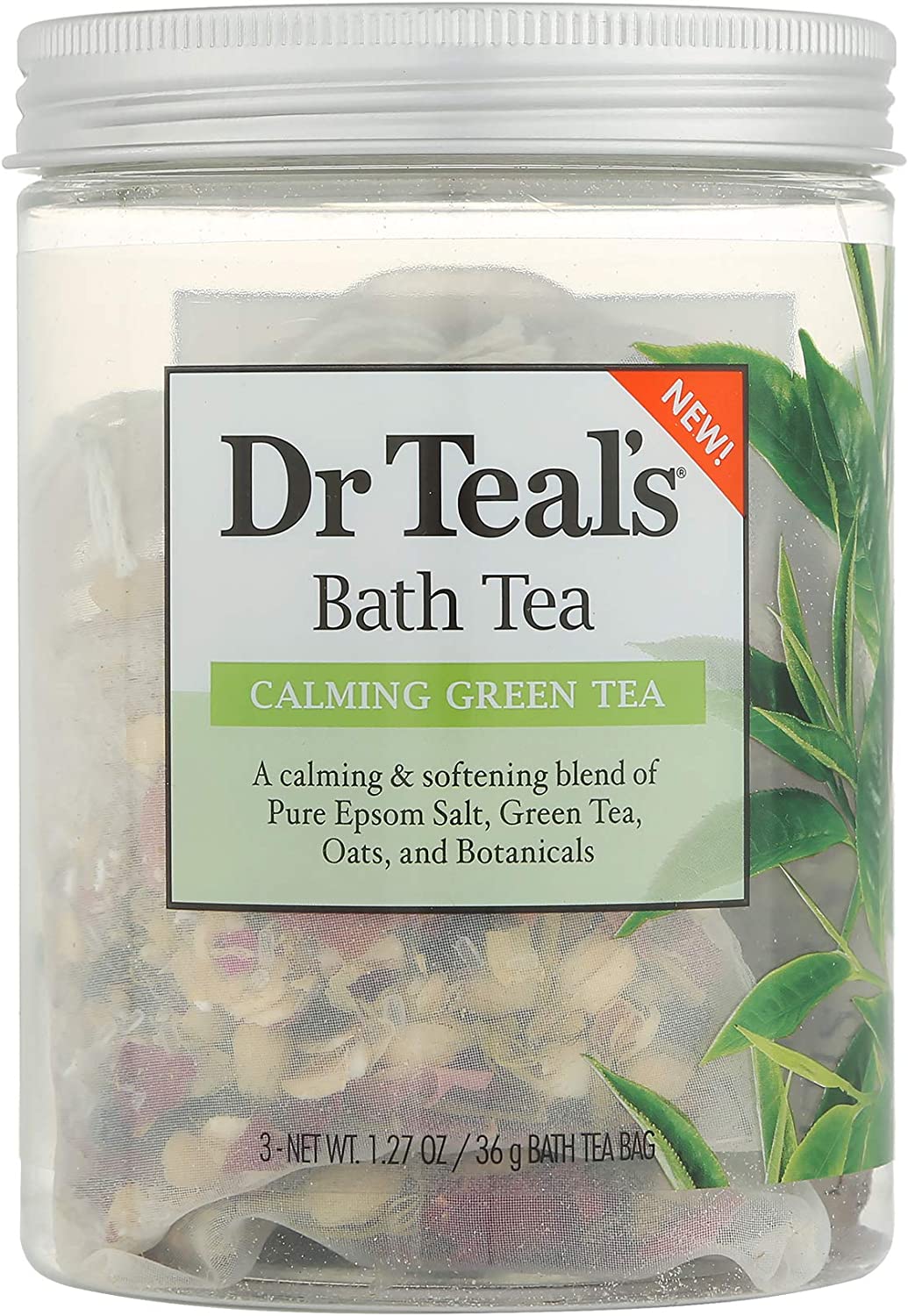
Green tea is known for being a powerful antioxidant with a wide range of benefits for your skin, gut, brain, and mood. So, why not add a little green tea to your bath? You can toss in a handful of regular green tea bags or opt for one bag of Dr. Teal’s green tea bath blend, which also includes oats, Epsom salt, and fragrant florals like rose and jasmine.
Pros:
- Includes soothing oats and Epsom salts
- Florals like jasmine and rose add a visual and olfactory effect
Cons:
- Pricier option
Things to add to your bath from your pantry
10. Citrus
Cut lemons, oranges, grapefruits, or the citrus fruits of your choosing into thin slices and add them to the bath for an invigorating, stress-zapping mood boost. "The citrusy, brighter, more energetic fragrances that really wake you up are wonderful," says Weiss. And, when it comes to DIY bath additives, this is one of the most budget-friendly options around.
11. Sake
Sake baths are a Japanese tradition and are said to leave skin softer and brighter because of the kojic acid found in this rice wine. "It’s super rich in enzymes and has over 20 amino acids that are the result of the fermentation process. Because of this, it gently exfoliates skin and feeds it with vitamins, minerals, and proteins," Burnes previously told W+G. "It restores lackluster complexions and gives you your glow back."
12. Ginger
Feeling sore, achy, or unwell? For the benefits of a ginger bath, add half a cup of grated ginger to the water. "Ginger speeds up circulation, which creates heat, causing a sweat response," says Jennifer Palmer, a holistic wellness coach.
13. Coconut milk
Adding coconut milk to your bath can make it super luxe and hydrating. "Coconut milk is a super hydrator," says Tara Pelletier, co-founder of Meow Meow Tweet. "The water is nutrient-dense and the fat helps to smooth skin cells and lock in the hydration."
14. Milk
Milk contains lactic acid, healthy fats, proteins, and vitamins and minerals that benefit the skin, including vitamin E and zinc. “Lactic acid is a naturally occurring mild alpha hydroxy acid, which can gently exfoliate your skin while you soak,” says New York dermatologist Libby Rhee, DO. “Taking a milk bath once a week can leave your skin feeling soft, supple, and youthful.” For best results, Dr. Rhee suggests adding two cups of full-fat milk, a half-cup of honey, and the essential oil of your choice.
15. Baking soda
Considering that baking soda is a common anti-itch remedy, putting it in your bath will allow you to soothe itchy skin all over. "The alkalinity of baking soda can help neutralize the pH of an infected area and reduce itching," says dermatologist Keira L. Barr, MD.
What to watch out for
Yes, a piping hot bath feels amazing—but our experts warn against overheating your skin. "Hot water can be abrasive, stripping the skin of its natural oils, which leaves it dehydrated and dull-looking," says Stacy Chimento, MD, a board-certified dermatologist in Miami. She says the ideal temperature for a bath is between 100°F-110°F, which is warm but not uncomfortably hot. "If the water is too hot, the outer layer begins to break down, allowing the entry of bacteria and toxins and drawing out moisture," she says.
And no matter the temperature, sitting in a bath for a long time can lead to dry, itchy, raisin-y skin. "The concern is more [time in] hot water causing more evaporation of water from the skin and drying out the skin," Caren Campbell, MD, a board-certified dermatologist practicing in San Fransico and Napa California, previously told Well+Good. Adding moisturizing ingredients like oils and oats can help make your bath less dehydrating and allow you to take a nice, long soak.
What to use after your bath
You'll also want to apply moisturizer to your skin as soon as you get out of the tub, ideally while your skin is still warm and moist—this will allow the moisturizer to penetrate much deeper. Whether you use lotion or an oil is up to you, but we dropped a few ideas below to get you started.
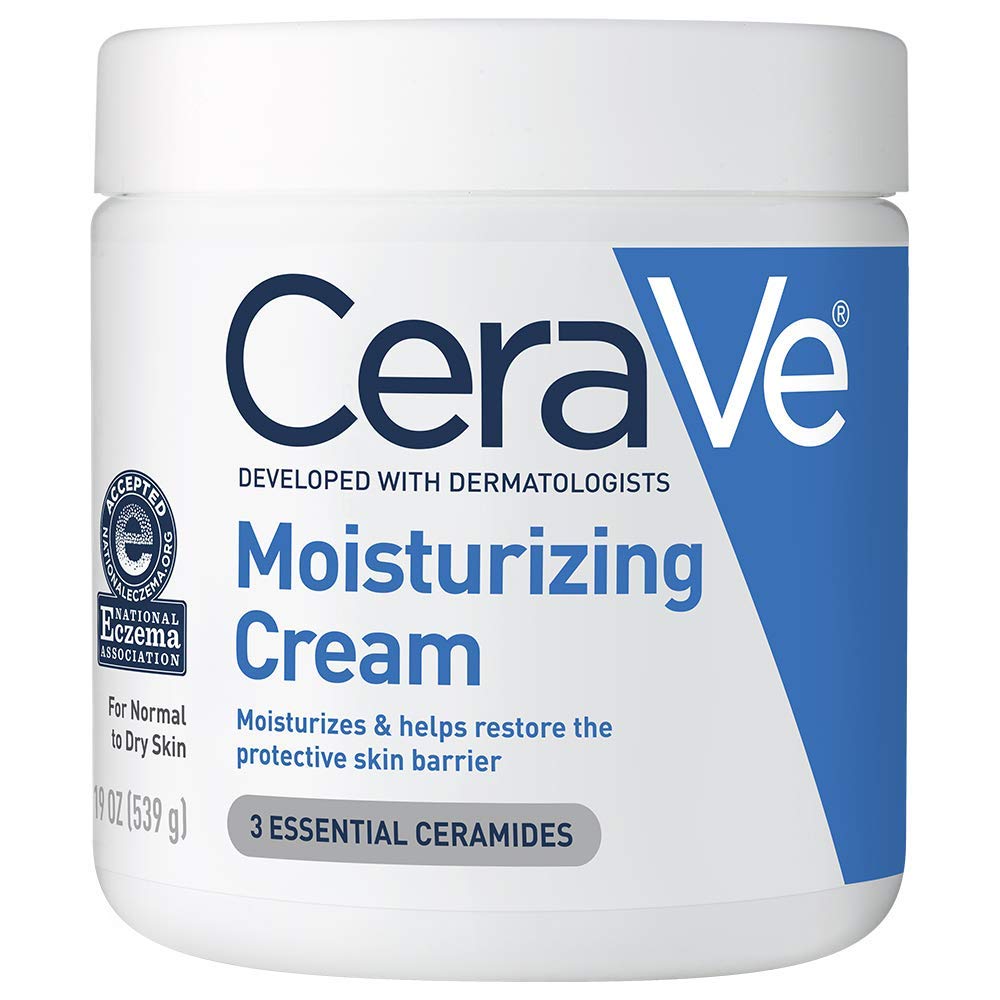
This cream from CeraVe is one of the most dermatologist-recommended moisturizers around. The formula includes hyaluronic acid, glycerin, and three types of ceramides that help to strengthen your skin barrier. Plus, it’s safe for sensitive skin types and widely available online and at most big box stores.
Pros:
- Dermatologist recommended
- Safe for all skin types, including those with Eczema
- Includes ceramides to strengthen skin barrier
Cons:
- Packaging isn’t the most hygenic
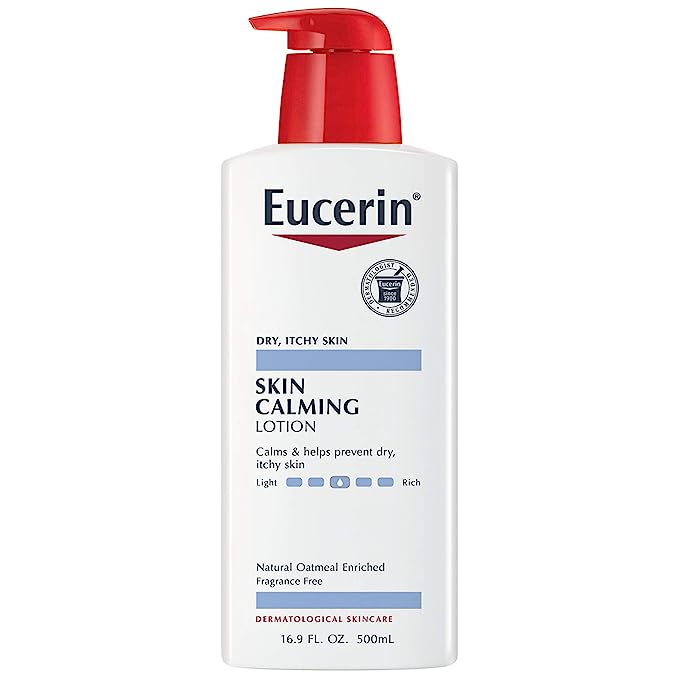
We previously dubbed Eucerin’s Skin Calming Lotion one of the best moisturizers for arms and legs, especially if you have dry skin. The pump-style dispenser and large size make it easy to slather on, while the formula’s blend of glycerin and colloidal oatmeal works to lock in moisture.
Pros:
- Super hydrating, non-greasy formula
- Easy pump dispenser
Cons:
- May be a little sticky
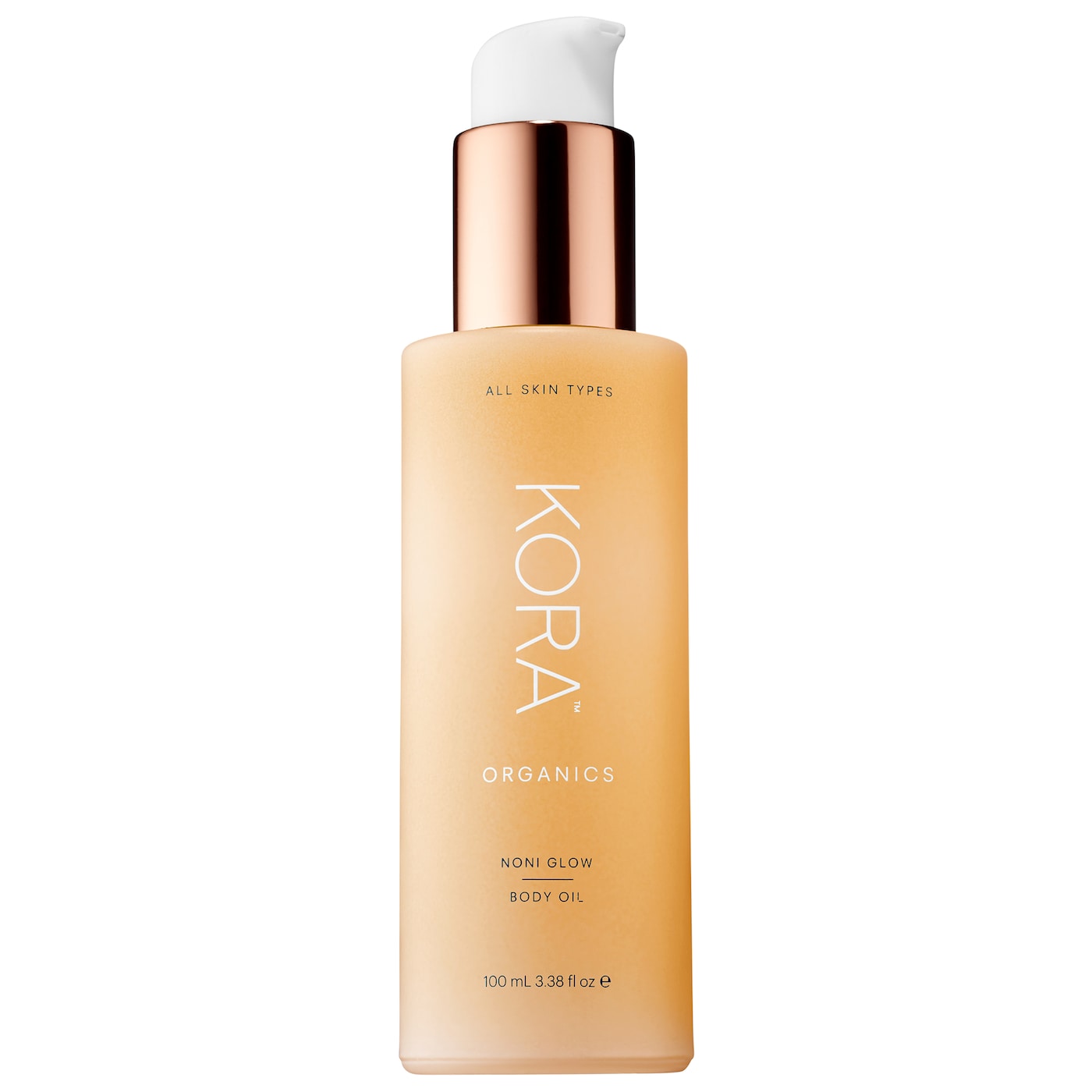
For something a little more elaborate, check out this body oil from Kora Organics. It includes organic skin-care ingredients like noni fruit extract (a source of vitamins and antioxidants), rosehip oil (which helps with sun damage), and sunflower seed oil (which helps the skin retain moisture).
Pros:
- Fast-absorbing oil
- Includes other skin-care ingredients like rosehip oil and noni fruit extract
Cons:
- Pricier option
FAQs
What is a good personal hygiene bath?
When it comes to hygiene, showers are superior to baths as the water (which will inevitably take on dirt and oil from your body) doesn't linger on your skin. However, if you're a bath lover, you can definitely still enjoy a soapy soak. Consider dry brushing in advance, using mildly warm water to avoid over-drying your skin, rinsing off in the shower afterward, and cleaning your bathtub regularly.
What are the best products for a bath?
Most dermatologists recommend sticking with bath products that are free of artificial fragrances and dyes, and overcomplicated ingredients. When it comes to soaking your body in bathwater, less is more. Luckily, we have plenty of recommendations!
How often do adults need a bath?
Whether you prefer to take a bath or a shower, personal hygiene is important. Still, it's not universal. Most people can benefit from bathing once a day, especially if you're active or work in an environment where you're exposed to dirt or germs. Other folks can get away with showering a few times a week. There's no hard-and-fast rule, as long as you're feeling good about yourself.
- Rashidi-Fakari, Fahimeh et al. “The effect of aromatherapy by essential oil of orange on anxiety during labor: A randomized clinical trial.” Iranian journal of nursing and midwifery research vol. 20,6 (2015): 661-4. doi:10.4103/1735-9066.170001
- Prasad, Sahdeo, and Amit K Tyagi. “Ginger and its constituents: role in prevention and treatment of gastrointestinal cancer.” Gastroenterology research and practice vol. 2015 (2015): 142979. doi:10.1155/2015/142979
Loading More Posts...